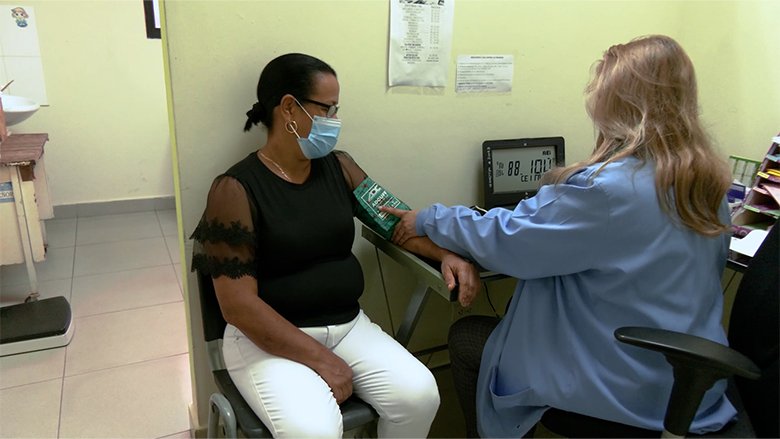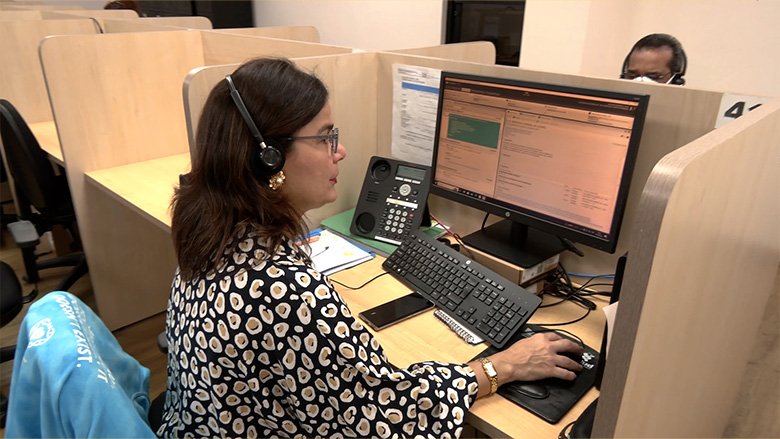Synopsis
Transitioning from immediate response to the COVID-19 pandemic, the World Bank is spearheading a resilience-focused health systems transformation in Latin America and the Caribbean, emphasizing investments in quality primary health care and climate-smart, climate-resilient infrastructure.
Challenge
The COVID-19 pandemic exposed significant vulnerabilities in pandemic preparedness and response, healthcare infrastructure, and care provision across Latin America and the Caribbean (LAC). LAC’s GDP contraction in 2020 hit 7 percent—the largest in the last 100 years and the worst worldwide. As of July 2022, LAC accounted for 13 percent of global cases and 1.5 million deaths, despite representing only 8.5 percent of the world’s population. LAC spends an average of $1,155 per capita on health, less than one third of the Organisation for Economic Co-operation and Development (OECD) average of $3,999. The region has only 2.1 hospital beds per capita, much lower than the OECD average of 4.3. These underlying vulnerabilities are exacerbated by the region's exposure to climate-related disasters, underscoring the need for a comprehensive strategy to enhance the resilience of health systems and preparedness for future health emergencies.
Approach
The World Bank’s approach to building resilient health systems in Latin America and the Caribbean is informed by recommendations from Building Resilient Health Systems in Latin America and the Caribbean: Lessons Learned from the COVID-19 Pandemic and Walking the Talk: Reimagining Primary Health Care after COVID-19. These priorities—outlined in a ministerial statement signed by LAC health ministers in early 2023—call on finance ministers to further invest in cost-efficient interventions to strengthen the resilience of health systems and mental health outcomes by:
Strengthening emergency prevention, preparedness and response: The World Bank is investing in better health emergency prevention, preparedness, and response, and ensuring effective collaboration in the face of public health and climate-related threats. These investments include, for example, procuring vaccines and essential medicines or equipment; constructing climate-resilient health infrastructure; enhancing laboratory services and surveillance systems; developing emergency preparedness and disaster plans; and providing trainings for health care workers on infection controls and prevention. Analytical services and technical advice have also been provided to conduct resilience and preparedness assessments, offer tailored policy recommendations, and help countries improve their public health data collection and analysis.
Promoting resilient health financing: The World Bank is supporting the implementation of health financing reforms that drive better population health outcomes and financial protection, reduce waste and inefficiencies, and ensure the financial sustainability of health systems. This includes, for example, advocating for health taxes to boost government revenues and improve health outcomes, alongside increasing health spending to achieve effective Universal Health Coverage and transforming payment and purchasing mechanisms to bolster public health systems against future crises. For example, the World Bank has been supporting results-based financing operations to strengthen health systems and expand access in Argentina for nearly 20 years, from the original Plan Nacer project and its successors (including to the SUMAR Program, the recently approved Program for Results operation and the new Digital Health investment project in the Province of Buenos Aires.. This sustained approach has been a central element in Argentina’s strategy to improve its public health system, serving as a strategic tool for organizational transformation, the strengthening of institutional capacities within the country's health system at the national and subnational level, and expanding access to healthcare particularly preventive care, for previously uninsured people and other vulnerable populations.
Fostering human capital through high-quality primary health care (PHC): Enhancing PHC as the cornerstone of resilient health systems, supported by investments in telehealth and telemedicine to improve service delivery and system adaptability. For example, in the Dominican Republic, a $190 million International Bank for Reconstruction and Development (IBRD) loan is expected to help at least 250 PHC public healthcare facilities meet the criteria to obtain their accreditation. Similarly, the recently approved $200 million Program for Universal Primary Healthcare Coverage and Resilience operation in Chile and the $304.5 million Program for Improved Access to Effective Health Services for the Vulnerable and Enhanced Health System Resilience operation in Colombia exemplify the World Bank's strategic shift towards integrating resilience into health care planning and implementation, ensuring that health systems are robust enough to withstand and adapt to the growing challenges of global health threats and climate change. This approach is further evidenced by the World Bank’s support to telemedicine efforts in countries such as Panama and Argentina, where digital health infrastructure can help bridge the gap in healthcare access during emergencies, but also improve everyday health service delivery. The recently formed World Bank/Pan-American Health Organization (PAHO) Lancet Commission on PHC and Resilience in Latin America and the Caribbean is supporting this agenda by collectively generating actionable knowledge to improve PHC resilience, ensuring that health systems are resilient to health shocks.


